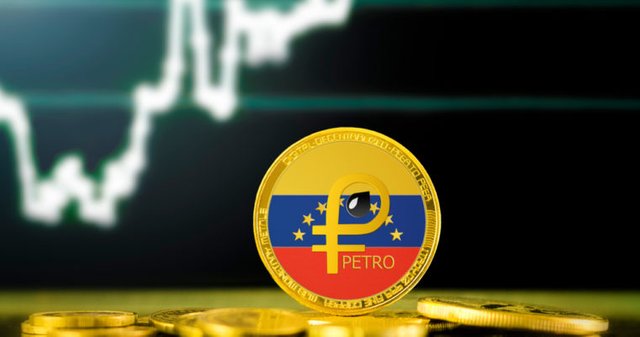¿What is (really) the PETRO? The cryptocurrency of Venezuela - ¡WHAT THEY DID NOT TELL YOU!
When invading a serious economic and social crisis, Venezuela, that looked for alternative financing in front of a national currency, Bolivar, in disorder, launched its own cryptocurrency last February. Named "Petro" because backed by its oil reserves, this virtual currency, the first officially issued by a state, really has a future? Decryption.

China, India or even more recently Iran. All these nations have expressed the desire, with greater or lesser conviction, to lay the foundations for their own cryptocurrency. But for now, only Venezuela has crossed the Rubicon, putting into orbit the "Petro", a virtual currency backed by the country's oil reserves. "The country is trying to excite Bitcoin, Ethereum and others to find an alternative to the hyperinflation facing the country," said Tristan Colombet, DomRaider's CEO and art expert. one of the first cryptocurrency fundraisers in France. A galloping hyperinflation that forced the Venezuelan authorities to literally "take out" three zeros from the official currency. Therefore, an egg tray worth 250,000 bolivars "old" now equals 250 new bolivars. In an attempt to counteract this phenomenon, Caracas focused on the baptismal font, Petro. Jorge Rodríguez, Minister of Information and Communication of the Bolivarian Government, visiting France and interviewed by us, returns to the genesis of this "alternative" currency.
"We have at our disposal some particularly innovative elements that can help us solve the economic crisis and get the country out of its lethargy." On the one hand, Venezuela is home to one of the largest oil reserves in the world with 300 billion barrels. and gold reserves are also very important, and on the other hand, the cryptocurrency universe offers great freedom compared to conventional financial systems, which is why President Maduro decided to combine these two factors to launch Petro. "
The problem, however, if it is true that oil resources are considerable, it is necessary to assume that they are mobilizable. However, the national black gold production has been reduced by 29% throughout 2017, while it constitutes 96% of the country's resources. Difficult under these conditions to imagine Petro rescue, eventually, the caisses of the country.

Fall of 29% of national oil production in 2017
However, the government announced last Thursday that the sale of Petro had brought to the Venezuelan state $ 3,300 million, of which $ 1,700 million will be used to import "food, medicines and medicines". raw materials for the industry. "As a reminder, imports of medicines and medical supplies collapsed with the economic crisis in Venezuela, because the second" apple of contention ", with respect to Petro's viability, is simply trust, the stone If there is a cryptocurrency, however, in an economically exhausted country (the external debt is estimated by some experts at 150 billion dollars), hit hard by US sanctions, how to awaken the appetite of foreign investors? "I find it extremely complicated, because the first quality to attract investors is trust. However, it is clear that she is not on the appointment. Also, I do not believe that Petro will change the lives of Venezuelans because they obviously do not have the logistical and financial means to buy this cryptocurrency through Bolívar, "says Tristan Colombet.
But obviously the government has more ideas. Anxious to overcome the idea that Petro would depend solely on oil revenues, Jorge Rodríguez sees the appearance of this new currency as a "test ball". "It is only a first step, in the longer term, we will have" petro d'or "or" petro de diamant. "Today, the value of Petro is equivalent to one barrel of oil, and I am still convinced that Petro can sometimes even exceed the value of the barrel.One day, we will sell our oil in Petro.It has the capacity to become one of the most influential cryptoactives on the planet. " A resolutely ambitious postulate that in spite of everything risks facing the principle of reality, considering the colossal debt of a country almost in default. However, a positive point: the Petro will be less sensitive to volatility, unlike its classmates, because it is backed by the price of oil. But here too, the lack of clarity of the authorities marks Tristan Colombet. "It is difficult to say that Petro is strictly based on the price of crude, since the device is particularly centralized and somewhat opaque."

Real alternative or deviation attempt?
So, the Petro, a real breath of oxygen for the Venezuelan economy or an umpteenth attempt at economic deviation from a government at bay? Here also its "use" raises questions. Petro intends to circumvent US international sanctions and be exchanged in foreign transactions. However, this "function" is already fulfilled by bitcoin et al. So, why do you prefer this "made in Caracas" currency to other "cryptocurrencies" already available in the market? The energy consumption aspect of these virtual currencies is, however, a brake, according to Jorge Rodríguez, compared to Petro, who has serious advantages over their land, compared to "competition". "Venezuela offers the cheapest electric power in the world and Internet access is also cheap, and as a result, mining in Venezuela is therefore particularly easy and accessible to all, we already have negotiation platforms." I'm not sure it's enough.

